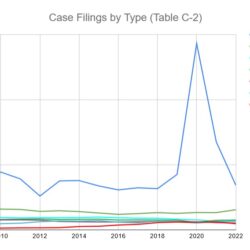In July, we received an excellent ruling from the court on cross-motions for summary judgment in Trivette v. Tennessee Department of Correction. While two of our plaintiffs were dismissed out… Read Moreabout Excellent Order for Deaf Prisoners in our Case Against Tennessee Department of Correction
Author: Amy Robertson
ADA Defense Lawyers Prolong Litigation and Postpone Access: A Case Study of Litigation Abuse
[Originally published on the blog of the Civil Rights Education and Enforcement Center on February 27, 2018.] Title III of the Americans with Disabilities Act (ADA) prohibits disability discrimination by… Read Moreabout ADA Defense Lawyers Prolong Litigation and Postpone Access: A Case Study of Litigation Abuse
Acheson Hotels v. Laufer: Revenge of the Data Nerds
Fox & Robertson along with a dream team of drafting partners filed an amicus brief today in the case of Acheson Hotels v. Laufer, currently pending in the Supreme Court…. Read Moreabout Acheson Hotels v. Laufer: Revenge of the Data Nerds
Take Our Survey: Hoteling While Disabled
Ever frustrated because a hotel website doesn’t provide enough – or any – information to reserve the accessible room you need? Tired of having to call and getting the run-around… Read Moreabout Take Our Survey: Hoteling While Disabled
F&R, DREDF submit amicus brief in support of proactive ADA enforcement.
Fox & Robertson, along with Michelle Uzeta of the Disability Rights Education and Defense Fund (“DREDF”) drafted an amicus — or “friend of the court” — brief to the Ninth… Read Moreabout F&R, DREDF submit amicus brief in support of proactive ADA enforcement.
Deaf and Hard of Hearing People in Colorado Prisons Will Get Interpreters, Other Effective Communication and Accommodations
Disability Law Colorado Settles Lawsuit Against Colorado Department of Corrections Disability Law Colorado (DLC) and the Colorado Department of Corrections (CDOC) have reached a settlement in a lawsuit DLC brought… Read Moreabout Deaf and Hard of Hearing People in Colorado Prisons Will Get Interpreters, Other Effective Communication and Accommodations
National Federation of the Blind of Colorado, Blind Prisoners Resolve Suit Against CDOC.
Colorado Department of Corrections will Correct Systemic Failures that Threatened Privacy and Safety of Blind Incarcerated People. Brian Christopher Mackes and Adrian Chávez, two blind men in the custody of… Read Moreabout National Federation of the Blind of Colorado, Blind Prisoners Resolve Suit Against CDOC.
This is what a technicality looks like.
Defendant: does a thing that violates a civil rights law. Plaintiff: files suit under said civil rights law. Court: Defendant did the thing but you can’t show that it will… Read Moreabout This is what a technicality looks like.
Tim Fox Appointed to Monitor Landmark Fair Housing Settlement
A federal district court in California appointed Fox & Robertson partner Tim Fox as the monitor in the landmark fair housing settlement in Independent Living Center of Southern California v…. Read Moreabout Tim Fox Appointed to Monitor Landmark Fair Housing Settlement
Hello [again], World!
After an eight year hiatus from 2013 to 2021 to found and grow the Civil Rights Education and Enforcement Center — now renamed Disability Law United — Fox & Robertson… Read Moreabout Hello [again], World!






